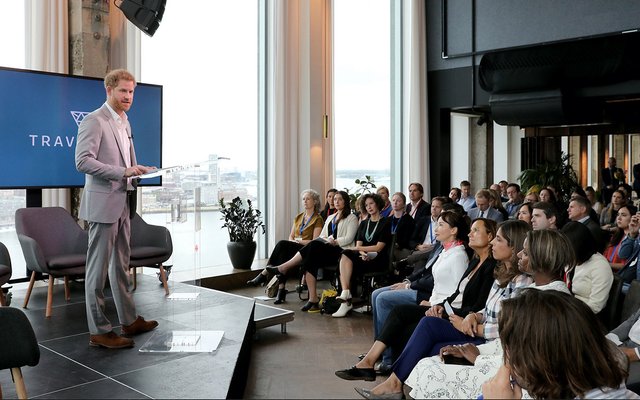Here is my second entry to the @themarkymark contest :

Sustainability is a very important issue that has been surfing on the crest of the wave very often in recent years (especially after social media decided to "buy" this fight and spread their ideas through activists who act directly in this sensitive cause). Amazingly, there are people who believe that this is just an opportunistic strategy and a new way to make more money... Which in part is still true, although not an absolute fact because de worry exists.
After some time, reaching a global reach, this theme caught the attention of millions of people (and the number of stakeholders continues to increase frequently as new debates are being built) and has become a vastly scalable interest that has encouraging projections for the next few years (considering the news on the horizon).
All sectors - to a greater or lesser extent - that have a keener survival instinct and are ruled by bosses with a more forward-looking future reality are trying to find solutions so that they can continue to exploit their resources and continue working to provide services to the population without their raw materials becoming extinct.

Launched in Amsterdam (Netherlands) on September 3 this year, the initiative (which is supported by some of the major global tourism companies: Skyscanner, Visa, Ctrip, Booking and TripAdvisor and was announced by Prince Harry, Duke of Sussex, a direct partner of these companies in the journey for environmental protection and preservation) has the direct objective of impacting the way places are explored within the travel market.

Within its main spectrum are the ideas of fostering sustainable tourism worldwide (and hopefully this will become a trend) and a fight against predatory practices (which often take place in different environments and at different levels). As an extremely recent project, it is still in its infancy, but the creators are making no effort to attempt to minimize any of the damaging effects predatory tourism can have, and how this project can help local communities continue to benefit (now the right way).
Understanding that tourism is considered as the only source of income that some communities have, this project aims to reduce the most urgent dangers in order to maximize all the opportunities that are present in this sector of work. Thus, the flag that Travalyst raises is directly associated with the idea that sustainable tourism has to be popularized to the fullest (and most efforts are currently focused on creating strategy for the tourism industry).

Some of the measures such as informing travelers about the degree of animal protection of an accommodation, tour or destination (in general) have been the wind driving the project and the results have been positive because it has a direct impact on how - and where - people are choosing to travel. According to figures from the World Tourism Organization, the number of travelers around the world in 2018 was 1.4 billion (an increase of 6% compared to the previous year). Projections for 2019 point to a 4% increase over this index.
It is estimated that in the next four years this sustainable market will grow by about 10%, reaching the $ 340 billion mark. This shows that global demand for travelers is increasing and it is expected that actions to reduce the bad impacts caused by poor quality tourism will be reduced considerably.

According to figures released by the Booking company (for example), the percentage of tourists who show interest in more sustainable travel options is 71% and within that number 68% of them believe the money they spent on their travel should be directed to residents in a more direct way.
Of course, the future of this market is not just about Travalyst (I chose it just to be able to write the publication and address the topic more properly because it is a great example), but the fact is that it will be initiatives like these that get intensified. Over the years, they will cause a real revolution not only in the tourist market itself, but especially in the consciousness of society as an interdependent community among its individuals.
You posted this same article 3 times. Posting the same thing multiple times, even if it is for other languages, is considered spam and can result in being muted. Everyone has the ability to translate posts if needed. There is no need to post multiple times in different languages.
Downvoting a post can decrease pending rewards and make it less visible. Common reasons:
Submit
Thanks for the warning, but as you can see... My intention is NOT to post an content that might be considered spam, it's just a useful way I've found to be seen by other major communities (English and Spanish). If I only post in Portuguese, my relevance on this platform will be practically nonexistent (because the Brazilian community is very inactive).
Plus, this is a quality and useful article for the community... And I repeat, my intention is NOT to provoke any kind of act that can be considered as spam and I believe this is very clear in the type of content that is in the article, just like the fact that I am a user who always acts correctly.
I understand that this idea may not be very systemically viable (and I apologize if this is interpreted as an inconvenience), but it was necessary for my content to be seen and recognized.
What I will try to do from now on is to decrease the frequency of my posts so that I don't risk being punished.
Downvoting a post can decrease pending rewards and make it less visible. Common reasons:
Submit
Hello,
Your post has been manually curated by a @stem.curate curator.
We are dedicated to supporting great content, like yours on the STEMGeeks tribe.
Please join us on discord.
Downvoting a post can decrease pending rewards and make it less visible. Common reasons:
Submit